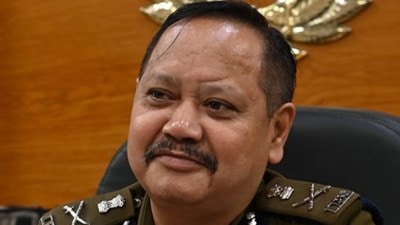Bangladeshis to be traced, ‘thrown out’
Close on the heels of a crackdown on the 11,500 Pakistanis staying illegally in India, the Union Government has issued directions to all sta...

Close on the heels of a crackdown on the 11,500 Pakistanis staying illegally in India, the Union Government has issued directions to all states and union territories to ‘‘locate and throw out’’ the 20 million Bangladeshi illegal migrants in the country.
Deputy Prime Minister L.K. Advani, inaugurating a conference of chief secretaries and director generals of police here today, observed that the illegal migrants posed a ‘‘serious threat’’ to the internal security of the country. He said that to facilitate the process of weeding out Pakistani and Bangladeshi nationals, the government had decided to launch the Multi-Purpose National Identity Cards (NIC) scheme as a pilot project in 13 states from April 1.
Simultaneously, the government has also decided to beef up internal security in order to effectively counter the looming threat of terrorism. On the recommendations of the Group of Ministers (GoM), the Home Ministry has already set up a multi-agency centre (MAC) that collates intelligence inputs received from the Research and Analysis Wing (RA&W) and Defence Intelligence Agency (DIA).
The intelligence, after being assessed by the MAC, is passed on to the Joint Task Force on Intelligence (JTFI) that is now the nodal agency for counter-terrorism operations. The JTFI, which gets inputs from internal security agencies, then energises the concerned state governments into action by giving them actionable intelligence. Both the MAC and the JTFI are currently being headed by Intelligence Bureau Special Director A.K. Doval.
‘‘There is an urgent need to strengthen intelligence agencies in the states. Lack of timely advance information about terrorist activities, and ground-level intelligence was sorely lacking,’’ said Union Home Secretary N Gopalaswami, giving details of thee decisions taken during the conference.
The home secretary said that setting up of such an agency had become imperative since the menace of terrorism was not confined to the states of Jammu and Kashmir and the Northeast. ‘‘All states have to be alert to prevent terrorist acts. The states have been asked to set up special task forces — comprising highly-trained persons — to effectively counter terrorist activities,’’ he said.
IB Director K P Singh explained that the MAC would serve as a data bank of vital information besides helping state police forces and other agencies in detecting and cracking terrorist modules. Its functioning will be supplemented by standing committees, comprising central and state intelligence representatives, which would review the strengths, weaknesses and requirements of state intelligence branches.
The home secretary said the proposed National Identity Card scheme would go a long way in curbing terrorism. ‘‘The 13 states that have agreed to take up the scheme as a pilot project have identified the taluka/tehsil where it will be launched,’’ Gopalaswami said. The project will cover 28.5 lakh people at a cost of Rs 14 crore. The states/UTs where the project will be launched from April 1 are J&K, Gujarat, Uttranchal, Uttar Pradesh, Andhra Pradesh, Rajasathan, Assam, West Bengal, Tripura, Tamil Nadu, Pondicherry and Delhi.
Also on the anvil is a multi-pronged strategy to deal with the problem of left-wing extremism.
‘‘There are nine affected states and it is being felt that emphasis should be on development of the states and on grievance redressal mechanism. The Planning Commission has decided to provide Rs 15 crore to naxalism-affected districts of the states for three consecutive years. Each district wil thus get Rs 45 crore over three years, to fill in critical gaps and incorporate developmental schemes,’’ the home secretary added.
In addition, it was also decided to improve management of the coastlines by strengthening patrolling and surveillance of the coastal areas. The coastal states and UTs had been asked to submit their perspective plans of action to MHA by January 31.



- 01
- 02
- 03
- 04
- 05




























